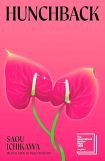Hunchback by Saou Ichikawa and Polly Barton (translator)
| Hunchback by Saou Ichikawa and Polly Barton (translator) | |
|
| |
| Category: General Fiction | |
| Reviewer: Heather Magee | |
| Summary: A story challenging preconceived notions of disability, offering new realms of representation which purposefully unsettle the reader through humour and sexual themes. | |
| Buy? Yes | Borrow? Yes |
| Pages: 112 | Date: March 2025 |
| Publisher: Penguin | |
| ISBN: 978-0241700785 | |
|
| |
I was in the middle of a self-imposed book-buying ban when I made an exception for this one. What first drew me in was the book's bold fuchsia cover, followed by its striking title: Hunchback. This is a word I recognised to be loaded with historical and cultural baggage, often used to dehumanise or reduce. Curious, I leaned over the display table and turned to the back inside cover. There, I discovered the author: Saou Ichikawa, a woman diagnosed in childhood with congenital myopathy, a condition that causes severe muscular weakness and touches every aspect of her life. The title took on new complexity in light of her biography. I had to read it.
Translated expertly from Japanese by Polly Barton, the same translator who rendered the bestselling Butter into the English language, Hunchback has been longlisted for the international Booker Prize 2025, and won the 128th Bungakukai Prize as well as the 169th Akutagawa Prize. Its accolades to these prestigious literary awards testify to Ichikawa's gift for writing, but also the content which is courageous, humorous and transgressive.
The protagonist of the story, Shaka, shares clear biographical parallels with Ichikawa. She, too, is a writer with a congenital muscle disorder. But, the similarities end there. Shaka writes erotic fiction and inflammatory tweets under an alias, all while confined to a care facility she helped design, owned by her wealthy parents. Her physical confinement and online anonymity speak to a broader social invisibility often tied to disability.
And yet, there is nothing masked about the content of Shaka's online stories. The novel opens full-frontal with one of these explicit scenes, set in a swingers club, which features agile, able bodies engaging in sex acts - a jarring contrast to Shaka's own default physical reality. The shock isn't the eroticism itself, however, but the preconceived assumption that a disabled body shouldn't or couldn't house such fantasies or desires. In this way, Ichikawa challenges the trope of the virtuous, pitiable disabled protagonist. Shaka is morally ambiguous, provocative, even manipulative (she flirts with caregivers, making unsettling demands). Her body is not sanitised for the reader's comfort; its fluids, functions, and frailties are presented unflinchingly. Is the body's function disgusting or erotic… or can it be both?
Ichikawa's refusal to sentimentalise or simplify the disabled experience is part of what makes Hunchback so vital. It resists the usual sympathy-tinged or heartrending narrative of disabled literature, replacing it with messy, transactional, sometimes uncomfortable expressions of agency and desire. Shaka is not here to inspire; she is here to live on her own terms. This conversation about representation is an important one which is prised open in this book.
Looking back, that book-buying ban that I set myself feels almost absurd. For all its thematic weight, Hunchback is written in a surprisingly airy tone, but one passage made me reconsider the entire notion of self-imposed restraint. Shaka expresses a searing frustration toward those who take the act of reading for granted: the ease of holding a book, flipping its pages, resting its weight in one's lap. What I had treated as a casual indulgence suddenly felt like a quiet luxury. The ability to read freely, physically, is a privilege not afforded to everyone.
I loved this book. I read it as soon as I bought it, and I'm so glad I did. That I broke my own ban to buy it feels somewhat appropriate. Hunchback isn't a book that waits patiently on the shelf or asks for quiet permission to be read. It compels you to pick it up, to hold it, to confront it. In all its jagged, unflinching honesty, it defies restraint, just as I found myself doing when I chose to take it home.
If you enjoy short translated fiction which leaves an impact, you'll love The Vegetarian by Han Kang.
Please share on: ![]() Facebook,
Facebook, ![]() Twitter and
Twitter and
![]() Instagram
Instagram
![]() You can read more book reviews or buy Hunchback by Saou Ichikawa and Polly Barton (translator) at Amazon.co.uk Amazon currently charges £2.99 for standard delivery for orders under £20, over which delivery is free. (Paid link)
You can read more book reviews or buy Hunchback by Saou Ichikawa and Polly Barton (translator) at Amazon.co.uk Amazon currently charges £2.99 for standard delivery for orders under £20, over which delivery is free. (Paid link)
![]() You could get a free audio download of Hunchback by Saou Ichikawa and Polly Barton (translator) with a 30-day Audible free trial at Amazon.co.uk. (Paid link)
You could get a free audio download of Hunchback by Saou Ichikawa and Polly Barton (translator) with a 30-day Audible free trial at Amazon.co.uk. (Paid link)
![]() You can read more book reviews or buy Hunchback by Saou Ichikawa and Polly Barton (translator) at Amazon.com. (Paid link)
You can read more book reviews or buy Hunchback by Saou Ichikawa and Polly Barton (translator) at Amazon.com. (Paid link)
Comments
Like to comment on this review?
Just send us an email and we'll put the best up on the site.


